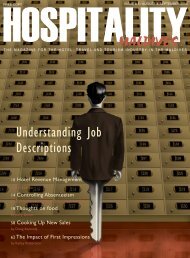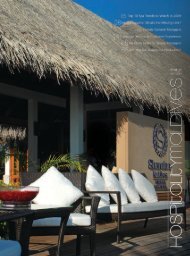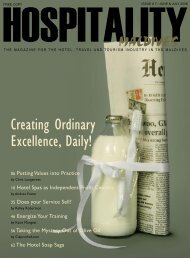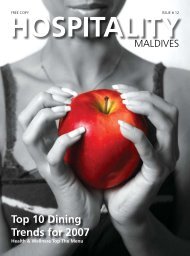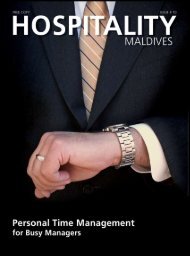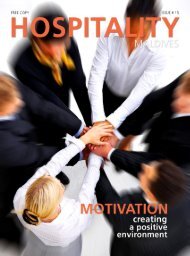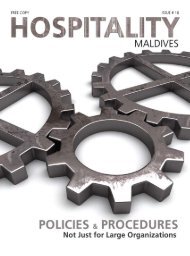Untitled - Hospitality Maldives
Untitled - Hospitality Maldives
Untitled - Hospitality Maldives
You also want an ePaper? Increase the reach of your titles
YUMPU automatically turns print PDFs into web optimized ePapers that Google loves.
But standing in the outside corridor, I noticed<br />
that the vast majority of participants<br />
were standing alone, either typing feverishly<br />
with their thumbs on tiny keypads or talking<br />
animatedly into thin air, with only a prominent<br />
metallic earpiece to indicate that they<br />
hadn’t lost their sanity and started talking<br />
to themselves. Standing there looking out at<br />
such a prestigious crowd, I couldn’t help but<br />
to ask myself what could possibly be more<br />
important at this very moment in time than<br />
networking with the top minds in your profession<br />
at an event you paid a registration<br />
fee and travel expenses to attend?<br />
Granted, as a veteran of hotel operations,<br />
I’m certain some of them truly had a crisis to<br />
handle, which is when such devices can make<br />
things better for everyone, including guests.<br />
But looking at the percentage of the audience<br />
that was standing outside alone versus<br />
networking with their peers, I just couldn’t<br />
believe that many hotels had bad enough<br />
luck to require their immediate attention at<br />
the very same moment.<br />
But our industry’s growing obsession with<br />
connectivity via cell phone and e-mail is not<br />
just evident when hoteliers are on the road<br />
at conferences and events. Too many general<br />
managers traverse their lobbies with a<br />
Bluetooth in one ear and a PDA in their suit<br />
coat pocket, ready to respond immediately<br />
to an e-mail from ‘corporate’ when it beeps<br />
or buzzes. The worst part is that it’s most<br />
often not by choice nor preference that hoteliers<br />
are chained to their devices, but out<br />
of necessity.<br />
Now this is not to say that the medium of<br />
e-mail is the enemy, nor that PDAs and other<br />
devices are themselves the distractions. But<br />
rather it is how we as an industry have adapted<br />
to using this enabling technology. For a<br />
very few, this technology has helped them<br />
better tune in to the needs of guests, and to<br />
improve communication and especially service<br />
efficiency. Yet for the vast majority, most<br />
are spending way too much time obsessing<br />
on keeping their in-box clean versus keeping<br />
their guests happy. While our industry has<br />
traditionally encouraged MBWA-Managing By<br />
Walking Around, a new and better acronym<br />
might be MBEE-M-Managing By Endless E-<br />
Mailing.’<br />
What’s ironic in all this is that I would argue<br />
today’s hoteliers are actually less organized<br />
with their filing and trace systems due to<br />
these e-mail devices. I cannot tell you how<br />
many times my most techno-savvy and earlyadapting<br />
hotelier friends are calling me for<br />
copies of an e-mail or attachment that they<br />
cannot find due to their e-mail filing systems<br />
(or lack thereof) because they read e-mails<br />
on various devices.<br />
So, if you are ready to turn off (periodically<br />
of course) the beeping, blinking or vibrating<br />
PDA you are carrying around right now, and<br />
instead ready to tune more into the needs<br />
guests and associates, here are some suggestions:<br />
Schedule a set time and place to read and<br />
respond to your e-mail versus responding to<br />
every ‘ping’ from your Outlook e-mail server<br />
or buzz from your PDA and allowing the incoming<br />
message to re-order your day’s priorities.<br />
Set up separate e-mail inboxes, one for ‘external’<br />
customers, which, of course, truly require<br />
and justify a quick response, and the<br />
other for ‘internal’ e-mails from colleagues,<br />
associates and vendors that are not as time<br />
sensitive.<br />
Use e-mail to inform, notify, update and to<br />
survey. But when it comes time to negotiate,<br />
brainstorm or to work through complex problems,<br />
pick up the phone, or even better, visit<br />
in person when possible.<br />
Avoid e-mailing every thought or idea that<br />
comes into your head at any given moment.<br />
Instead, add them to running task lists or<br />
brainstorming journals that you can bring up<br />
in person at an appropriate time when they<br />
can be given due consideration.<br />
If you find yourself e-mailing the same person<br />
more than two or three times per day,<br />
don’t! Instead, make a running list of issues/<br />
topics to discuss with them. Then at a regular<br />
time of the day hold one direct conversation<br />
(preferably in person or at least over<br />
the phone) and knock out all of the issues of<br />
concern at once.<br />
If you work for a corporate office or ownership<br />
group, make sure your on-site executives<br />
know that their first job is to take care<br />
of the guests and associates, and that your<br />
e-mails and phone calls can (and should)<br />
be responded to later when time allows. Be<br />
aware of how both planned and unplanned<br />
activities in the hotel and local area can impact<br />
the hotel and its management team’s<br />
priorities.<br />
If you are a g.m., v.p. or other top-tier, onproperty<br />
executive, make sure you have a<br />
bias toward talking in person or at least on<br />
the phone versus e-mail. Not only will this<br />
reduce the time your executive level managers<br />
spend e-mailing you back but you will set<br />
the tone for your hotel’s ‘e-mail culture’ and<br />
along the way foster teamwork by reducing,<br />
if not eliminating, the frequent miscommunications<br />
that occur within companies that<br />
obsess on e-mailing.<br />
By choosing how we utilize these enabling<br />
technologies, we can ensure that they are<br />
best utilized to help us improve communication-not<br />
to over-communicate.<br />
Doug Kennedy, President of the Kennedy Training Network, has been a fixture on the hospitality and tourism industry conference circuit since 1989, having presented<br />
over 1,000 conference keynote sessions, educational seminars, and on-premise training workshops for diverse audiences representing every segment of the<br />
lodging industry. Visit www.kennedytrainingnetwork.com for details or e-mail him at: doug@kennedytrainingnetwork.com.




